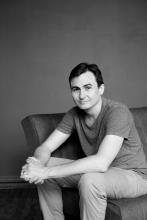The Department of Economics is thrilled to welcome Dr. Jason Kerwin, who will be joining us in Fall 2024 as a new faculty member. We encourage you to learn more about Dr. Kerwin through his bio and Q&A below and be sure to greet him with a warm welcome when you see him on campus!
Bio
Jason Kerwin currently a tenured Associate Professor in the Department of Economics and a Brimmer Distinguished Scholar at the University of Washington, an Affiliated Professor at J-PAL, and a Research Fellow at IZA. He received his Ph.D. in Economics from the University of Michigan, where he was also an Economic Demography Trainee at Michigan’s Population Studies Center. From 2015 to 2024 he was on the faculty of the Department of Applied Economics at the University of Minnesota. Jason’s research focuses on understanding the choices people in developing countries make about health, education, employment, and savings. To do this he combines randomized field experiments and other compelling causal inference methods with cutting-edge methods from econometrics and machine learning. Jason has done fieldwork in Malawi, Uganda, India, and Egypt. His papers have been published in journals that include the American Economic Review, the Journal of Econometrics, the Review of Economics and Statistics, and the Journal of Development Economics.
Q & A with Jason Kerwin, Ph.D.
What drew you to the field of economics?
“I got interested in development economics when I visited Tanzania as a college sophomore to do HIV prevention education in schools there. The trip opened my eyes to the wide variety of constraints that keep people from living the kinds of lives they want to--not just diseases like HIV and malaria, but also poor-quality education systems, limited access to banking, poor infrastructure, and more. I became passionate about international development, but frustrated with the lack of progress in the field. Then I took a course in economic policy analysis that opened my eyes to how economists approach these problems, and decided to shift focuses from my undergraduate major (physics) to economics, with the goal of joining the "randomista" revolution led by recent Nobel laureates Esther Duflo, Abhijit Banerjee, and Michael Kremer. Since entering the field, I have actually become a faculty affiliate at J-PAL, an organization set up by Banerjee and Duflo to run randomized experiments to study development interventions. That was one of my dreams when I decided to change careers, so it's been amazing to see that come to fruition.”
What is a recent project or paper you’ve worked on that you’re particularly proud of?
“We recently completed a 9-year followup of a literacy intervention in Uganda that ran from grades 1-3. The program was extremely effective: students end up several grade levels ahead in reading ability, and those effects persist for over 5 years after the intervention ends. So we were able to show some of the first evidence of long-run impacts from improving the quality education in the developing world. And the reading gains led to other impacts, in particular better progress through school. We just got another grant from J-PAL's Learning for All Initiative to follow the students in our study through adulthood. One thing that makes me particularly proud is that the NGO used our early results to raise additional funding for the intervention, expanding it to over 4 times as many students--so I played a direct role in actually helping more kids learn to read.”
What is one interesting fact about yourself that people might not know?
“I'll give you two: I was born and raised in Honolulu, Hawaiʻi, and my mother was a child actress who starred in an Academy Award-winning movie (it won Best Song).”
How do you spend your time outside of work? Any hobbies or interests?
“My wife and I have two kids who I love to hang out with and take on adventures. We also both love to play basketball, and are actively looking for places to play pickup with.”
